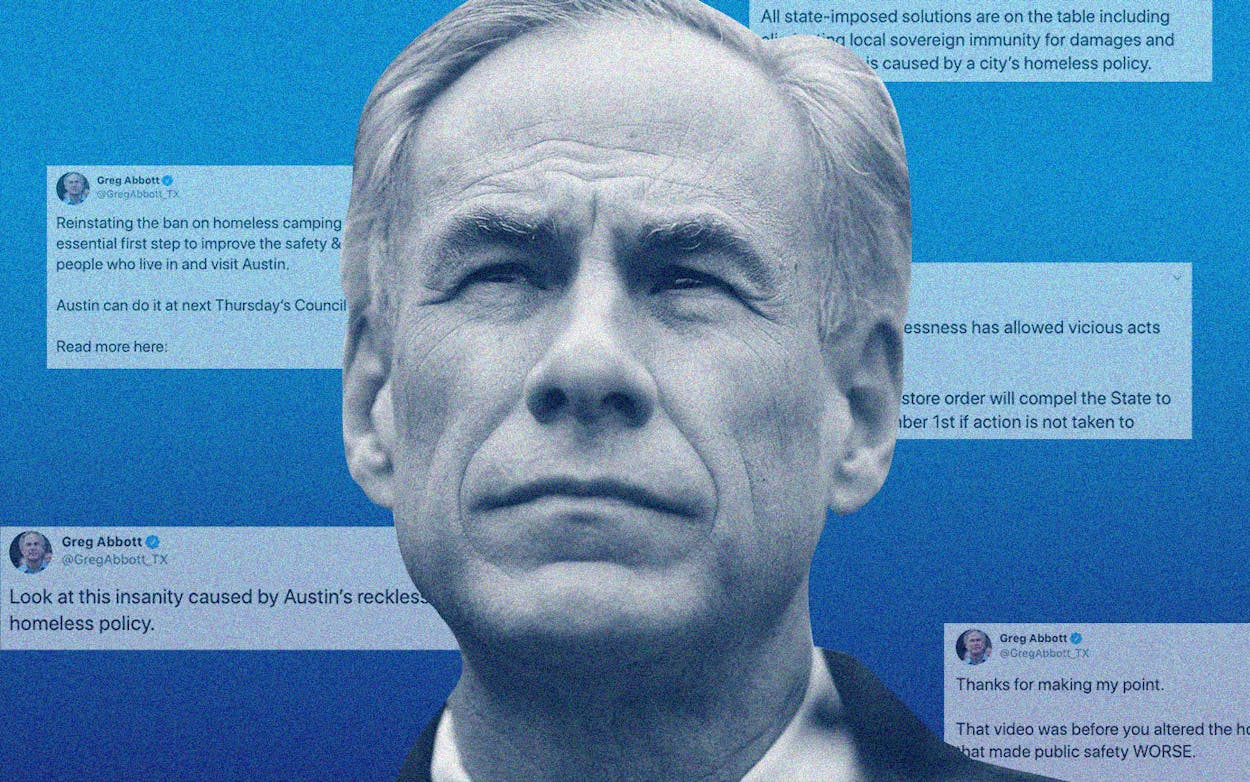On Saturday morning Krista Chacona, a criminal defense lawyer in Austin who specializes in mentally ill and indigent clients, got a news alert on her phone from a local TV station. Late the night before, Governor Greg Abbott posted an alarming video on his Twitter account to his some 314,000 followers. The video shows a man on a street corner in downtown Austin having some kind of episode. He flings a pole at a car, then picks up a temporary street sign and does the same. The car is damaged, but no one is hurt.
The video was posted by a Twitter account called @AustinSkidrow, a participant in the social media campaign against the Austin City Council’s efforts in June to decriminalize homelessness, which have been the subject of a bitter and divisive political fight in the city. Abbott, for whom messing with blue cities is a perennial political winner, has threatened Austin with some kind of state crackdown. He’s repeatedly highlighted individual incidents of crime in Austin using his Twitter account. With the video, he wrote: “Austin’s policy of lawlessness has allowed vicious acts like this.” He demanded the city “compel order.” In the replies, one man called the homeless “savages,” and another compared them to zombies.
As it turns out, the video was from February 2018, putting the incident well before anything the city council did. When the age of the video was pointed out to Abbott, he responded in the traditional manner of the internet, tweeting that his wrongness had only made him more right. Moreover, the city council in no way legalized or encouraged attacks on vehicles of the kind in the video. But as Chacona lay in bed reading the article, she realized she knew the case well: She had represented the man in the video in court.
“I was furious. It’s reckless,” Chacona said. “He didn’t even bother to check the facts.” The facts were that the man wasn’t homeless, and in fact had never been homeless. He has been diagnosed with mental illness and has developmental and intellectual disabilities. On the day of the “attack,” he was experiencing a mental health crisis. “He was never able to articulate to me what was going through his mind that day,” Chacona said. Arrested for felony criminal mischief, the man was ruled incapable of standing trial and his case is still pending.
The events captured by the video, Chacona said, were deeply traumatic for both the man and his loved ones. “It was obviously one of the worst days of their lives,” she said. And what infuriated Chacona even more was that the video, from her understanding, was initially posted on its creator’s Facebook account and nowhere else—which is to say that it hadn’t yet traveled widely on the internet.
“I think that’s why it’s particularly upsetting to his family,” Chacona said. Abbott’s posting of the video, which was retweeted more than 1,300 times, made the episode very public more than a year and a half after the family had started putting it behind them. “It’s inappropriate for him to broadcast on many levels,” she said, and “retraumatizes this man by putting his mental health issues on display to the world,” when a relatively cursory check would have uncovered the basic facts of the matter.
Chacona serves as a court-appointed defender for a number of people experiencing homelessness in Austin—and she feels they’re being put at risk by the governor’s rhetoric. “His continued efforts to equate homelessness and violence are appalling,” Chacona said. “He’s trying to make downtown Austin seem like the Wild West.” By repeatedly focusing the power of the governor’s bully pulpit on the “threat” posed by Austin’s homeless population, he’s harming people, she said. “People who suffer from mental illness are more likely to be victims than perpetrators and he’s feeding into these dangerous and false stereotypes.”
But the added indignity of Abbott’s tweets, Chacona said, is that it’s Abbott himself who could do the most to fortify a deeply inadequate mental health system in Texas. “Austin and so many other communities around the state needs funding. They need funding for addiction treatment, mental health services, both outpatient and inpatient services,” she said. “Not enough is being done to renovate and expand the state hospital system, to fund and provide facilities for restoration programs, not enough money being invested in alternatives to incarceration in the first place, hooking them up with services.”
The investment required is “such a small fraction of the budget. We have so much money that we can dedicate to these things, and we don’t,” she said. “I find it offensive that the only time we talk about mental health care is when it comes to defending gun rights.”
The man’s sister and mother told local TV news station KEYE on Sunday that they were deeply hurt by the posting of the video, and that they strongly wished he would delete his tweet. The station asked for a comment from the governor’s office and got none. (Neither did Texas Monthly.) As of Tuesday, the video was still up.
In the intervening period, Abbott has found time to tweet about the dog from the Abu Bakr al-Baghdadi raid, this weekend’s Texas A&M game, and a video about a gun-shooting robot from an account called @HumphreyTron69. He also weighed in on the scuffle over the Washington Post‘s headline for its al-Baghdadi obituary. “WaPo can’t even correctly write a correction,” he wrote.
- More About:
- Politics & Policy
- Homelessness
- Greg Abbott
- Austin








